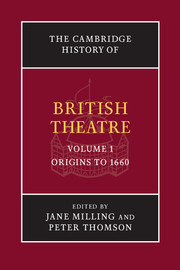Book contents
- Frontmatter
- PART I PRE-ELIZABETHAN THEATRE
- PART II ELIZABETHAN THEATRE
- 5 The development of a professional theatre, 1540–1660
- 6 Drama outside London after 1540
- 7 ‘An example of courtesy and liberality’: great households and performance
- 8 The birth of an industry
- 9 Theatre and controversy, 1572–1603
- 10 The condition of theatre in England in 1599
- 11 Ben Jonson's Every Man in his Humour: a Case Study
- 12 London professional playhouses and performances
- PART III JACOBEAN AND CAROLINE THEATRE
- Works Cited
- Index
- References
8 - The birth of an industry
from PART II - ELIZABETHAN THEATRE
Published online by Cambridge University Press: 28 March 2008
- Frontmatter
- PART I PRE-ELIZABETHAN THEATRE
- PART II ELIZABETHAN THEATRE
- 5 The development of a professional theatre, 1540–1660
- 6 Drama outside London after 1540
- 7 ‘An example of courtesy and liberality’: great households and performance
- 8 The birth of an industry
- 9 Theatre and controversy, 1572–1603
- 10 The condition of theatre in England in 1599
- 11 Ben Jonson's Every Man in his Humour: a Case Study
- 12 London professional playhouses and performances
- PART III JACOBEAN AND CAROLINE THEATRE
- Works Cited
- Index
- References
Summary
The period of literary history we call the English Renaissance has at its core the new commercial theatre of the sixteenth and seventeenth centuries. While the term ‘Renaissance’ may initially call to mind courtly writings, such as The Faerie Queene and Astrophel and Stella , it is the surviving texts of the commercial playhouses that have most strongly shaped our fascination with this period. So frequently are these plays edited, read, taught and performed, in fact, that they can seem freestanding monuments, dramatic stories left to history by the grace of a culture replete with literary talent. Yet in their own time, the dramas of such playwrights as Shakespeare, Marlowe, Jonson, Middleton and Webster were commodities, and perishable ones at that. Far from the glorified, handsomely adorned things that we encounter in classrooms, and on stage and screen, they were instead part of a bustling new theatrical business that may with justification be called an ‘entertainment industry’.
At first blush, the term ‘industry’ may seem too formal for use in this regard. Given its sometimes rag-tag players, secondhand costumes, impoverished playwrights, noisome playhouses and uncertain conditions of employment, the business of theatre at this time seems to have been so unpredictable, and generally so financially unrewarding, that to call it an industry risks implying a stability it did not possess. When seen from historical distance, and from the perspectives of those who worked within it, however, the business of theatre in the sixteenth and seventeenth centuries was indeed an industry; on the whole it offered the commercial production and sale of theatrical spectacle in a regularised, highly competitive environment.
- Type
- Chapter
- Information
- The Cambridge History of British Theatre , pp. 224 - 241Publisher: Cambridge University PressPrint publication year: 2004



